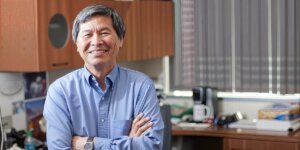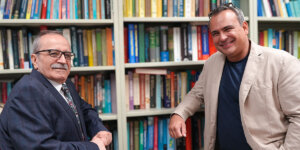
Matthew Fontaine was honored with the USC PhD Award at the 44th Annual Student Academic Honors Convocation on Monday, April 21, 2025, in Town and Gown on the University Park Campus. Photo/USC.
As an engineer in a self-driving car startup, Matthew Fontaine expected to put his research skills to work, tackling real-world challenges in autonomous vehicle testing. Instead, he found himself disillusioned with the direction of his work, navigating the pains of problem-solving in a startup environment.
“I wanted to be confident our system would hold up to real-world failures,” said Fontaine. “To really understand how to build safe autonomous systems, I knew I needed to go deeper into the research. That’s what led me back to academia and a Ph.D.”
Five years later, Fontaine has gone above and beyond in pursuing his dream. Working with Professor Stefanos Nikolaidis at USC’s Interactive and Collaborative Autonomous Robotic Systems (ICAROS) lab, Fontaine investigated algorithmic scenario generation as a quality diversity (QD) optimization problem.
This method helps ensure system safety by mapping out a wide range of possible outcomes, allowing researchers to identify the threshold of error a system can withstand before failure occurs.
Fontaine’s research efforts have earned him USC’s 2025 Ph.D. Achievement Award, which was presented to him at the 44th Annual Student Academic Honors Convocation on Monday, April 21, 2025, in Town and Gown on the University Park Campus.
Fontaine, who will graduate this May with a doctorate in computer science, hopes to start a research lab in the future focused on refining scenario generation algorithms. His goal is to make these algorithms a standard tool for testing robotics and AI systems before deployment, bringing his vision one step closer to reality.
We sat down with Fontaine to discuss his experiences as a USC Ph.D. student and the impacts of his research. Answers have been edited for style/clarity.
How does it feel to have received the USC Ph.D. Achievement Award for 2025?
It feels great! I’m very optimistic about the future of my research. I didn’t expect so much interest in testing systems rather than just pushing for high-profile results. It speaks to the fact that USC recognizes that this is an important problem, and I’m happy to be raising the profile of this problem.
Why did you choose USC to pursue your Ph.D.?
Culturally, there’s a huge difference between USC and other institutions. USC prizes a collaborative environment, and I worked with around nine different faculty members during my time here. Labs tend to be siloed at large universities. However, at USC, there are many events held by the robotics center where we get to talk to each other, which spurs collaboration. When you’re coordinating with very smart people, the research becomes more creative and impactful. That culture of collaboration is something that USC does exceptionally well.
I also got a good advisor match in Professor Stefanos Nikolaidis, who is open-minded and has a lot of expertise in robotics. Currently, it feels like we don’t know how to test LLMs thoroughly enough. How do we know these systems are ready for deployment? That’s the fundamental research problem I worked on during my PhD.
Can you give me a brief overview of your research?
My research focus is on quality diversity (QD) optimization–a powerful tool which sets the foundation for my scenario generation work. My work uses QD algorithms to test systems, but they have a wide range of other potential applications. When we want to make sure systems work, it’s not helpful to only look at a single worst-case point of failure. These failures are often unlikely, or they might not be the fault of the system.
QD algorithms help us view systems from a different angle. They allow us to look for subtle persistent problems that resulted from things being overlooked in the design process. For example, we designed some kitchen environments for robot teams to work in, similar to the video game Overcooked. However, the robots did not know to get out of the way after finishing their task, which caused an infinite loop of confusion. We found many instances where this was occurring and could more easily diagnose the problem than if we just had one really extreme example where the team couldn’t coordinate.
QD optimization gives us big advantages over just looking for worst-case failures. Not only can we understand what problems might come up, we also have a receipt that the system was tested rigorously when it finally does work, so that we can iterate and start to see fewer errors.
What is the potential impact your research could have on society?
QD optimization can apply to lots of different real-life systems. Systems are often black boxes, and this method helps us probe how the system interacts with the environment, as well as test how it performs.
We can use this method to test large language models, self-driving cars, or even home robotics. We recently used it to flag instances when a package labeling robot moved dangerously close to humans in its vicinity. We also investigated how to optimize warehouse layouts using the patterns generated by QD optimization methods, which can scale to really large warehouses.
To share our work with the world, we’ve released an open-source library with all our QD optimization and algorithmic scenario generation, so that other people can integrate it into their own research. There are tons of problems that will benefit from this method that I can’t even predict, so I wanted to funnel my work into a general tool that other researchers can apply in their own ways.
Published on May 13th, 2025
Last updated on May 13th, 2025













